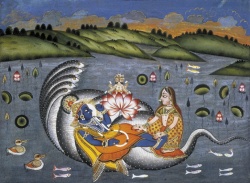Difference between revisions of "Serissaka"
(Created page with "thumb|250px| '''Serissaka''' 1. Serissaka. A Yakkha chieftain to be invoked in time of need by followers of the Buddha. D.iii.205. 2. Serissaka, Ser...") |
|||
| (3 intermediate revisions by the same user not shown) | |||
| Line 1: | Line 1: | ||
[[File:Shulman q85.jpg|thumb|250px|]] | [[File:Shulman q85.jpg|thumb|250px|]] | ||
| − | |||
| − | |||
| − | |||
| − | |||
| − | It is said (DA.iii.814; cf. ThagA.i.103) that the vimāna was called Serīsaka because there was, at its entrance, a large serīsa-tree, which bore fruit once in fifty years. Gavampati had earlier occupied the vimāna, when born as a devaputta. After his rebirth among humans, the vimāna was empty till occupied by Pāyāsi. But Gavampati sometimes visited it even after becoming an arahant. | + | |
| + | |||
| + | [[Serissaka]] | ||
| + | |||
| + | |||
| + | 1. [[Serissaka]]. A [[Yakkha]] chieftain to be invoked in [[time]] of need by followers of the [[Buddha]]. D.iii.205. | ||
| + | |||
| + | |||
| + | 2. [[Serissaka]], [[Serīsaka]]. A [[vimāna]] in the [[Cātummahārājika]] [[world]], which was occupied by [[Pāyāsi]] during his [[life]] there. [[Gavampati]], who used to go there for his siesta, met him and had a [[conversation]] with him, which he reported to the [[Buddha]] (D.ii.356f). The [[deva]] of the [[vimāna]] was also called [[Serīsaka]], and is evidently to be identified with the [[Yakkha]] [[Serissaka]]. | ||
| + | |||
| + | |||
| + | |||
| + | [[Pāyāsi]] was born in the [[Serīsaka-vimāna]], because, though he gave generously, he was careless about the [[manner]] of giving. [[Vessavana]] therefore stationed him in a desert, devoid of shade or [[water]], to {{Wiki|protect}} travellers from the dangers which beset them at the hands of [[non-humans]]. He came across some {{Wiki|merchants}} from [[Anga]] and [[Magadha]] who had lost their way while | ||
| + | |||
| + | |||
| + | journeying to [[Sindhusovīra]]. He revealed to them his [[identity]], and they [[offered]] to hold a {{Wiki|festival}} in his honour when they reached safety. But he suggested that gifts be given in his [[name]] to a pious man, named [[Sambhava]], who was in their company. Later [[Sambhava]] joined the [[Order]] and became an [[arahant]] (Vv.vii.10; VvA.331). | ||
| + | |||
| + | |||
| + | It is said (DA.iii.814; cf. [[ThagA]].i.103) that the [[vimāna]] was called [[Serīsaka]] because there was, at its entrance, a large [[serīsa-tree]], which bore fruit once in fifty years. [[Gavampati]] had earlier occupied the [[vimāna]], when born as a [[devaputta]]. After his [[rebirth]] among [[humans]], the [[vimāna]] was [[empty]] till occupied by [[Pāyāsi]]. But [[Gavampati]] sometimes visited it even after becoming an [[arahant]]. | ||
| + | |||
| + | |||
{{R}} | {{R}} | ||
[http://what-buddha-said.net/library/DPPN/s/serissaka.htm what-buddha-said.net] | [http://what-buddha-said.net/library/DPPN/s/serissaka.htm what-buddha-said.net] | ||
Latest revision as of 12:46, 30 December 2023
1. Serissaka. A Yakkha chieftain to be invoked in time of need by followers of the Buddha. D.iii.205.
2. Serissaka, Serīsaka. A vimāna in the Cātummahārājika world, which was occupied by Pāyāsi during his life there. Gavampati, who used to go there for his siesta, met him and had a conversation with him, which he reported to the Buddha (D.ii.356f). The deva of the vimāna was also called Serīsaka, and is evidently to be identified with the Yakkha Serissaka.
Pāyāsi was born in the Serīsaka-vimāna, because, though he gave generously, he was careless about the manner of giving. Vessavana therefore stationed him in a desert, devoid of shade or water, to protect travellers from the dangers which beset them at the hands of non-humans. He came across some merchants from Anga and Magadha who had lost their way while
journeying to Sindhusovīra. He revealed to them his identity, and they offered to hold a festival in his honour when they reached safety. But he suggested that gifts be given in his name to a pious man, named Sambhava, who was in their company. Later Sambhava joined the Order and became an arahant (Vv.vii.10; VvA.331).
It is said (DA.iii.814; cf. ThagA.i.103) that the vimāna was called Serīsaka because there was, at its entrance, a large serīsa-tree, which bore fruit once in fifty years. Gavampati had earlier occupied the vimāna, when born as a devaputta. After his rebirth among humans, the vimāna was empty till occupied by Pāyāsi. But Gavampati sometimes visited it even after becoming an arahant.
